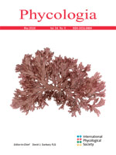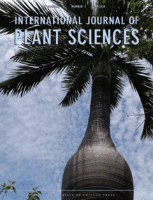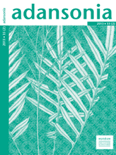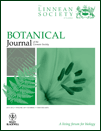
PHYCOLOGIA
metrics 2024
Catalyzing Discoveries in Algal Biology
Introduction
PHYCOLOGIA is a prestigious academic journal published by Taylor & Francis Ltd, specializing in the fields of Aquatic Science and Plant Science. With an ISSN of 0031-8884 and an E-ISSN of 2330-2968, the journal has established itself as an influential platform for disseminating high-quality research on algal biology and its ecological significance. Renowned for its rigorous peer-review process, PHYCOLOGIA is categorized in the Q2 quartile for both Aquatic Science and Plant Science as of 2023, reflecting its solid reputation and contribution to the respective fields, evidenced by Scopus ranks placing it in the top tiers of research outputs. The journal offers access to a wealth of knowledge, embracing studies that range from fundamental aspects of phycology to applied environmental sciences, making it a vital resource for researchers, professionals, and students who seek to advance their understanding of aquatic and plant ecosystems. With a focus on innovative methodologies and interdisciplinary approaches, PHYCOLOGIA invites submissions that push the boundaries of current knowledge and contribute to the global discourse on phytobiological sciences.
Metrics 2024
 0.43
0.43 1.50
1.50 2.10
2.10 75
75Metrics History
Rank 2024
Scopus
IF (Web Of Science)
JCI (Web Of Science)
Quartile History
Similar Journals

ACTA SOCIETATIS BOTANICORUM POLONIAE
Innovating the Future of Plant Ecology and ConservationACTA SOCIETATIS BOTANICORUM POLONIAE is a reputable open-access journal dedicated to the field of Plant Science, published by the Polskie Towarzystwo Botaniczne since 1923. With an ISSN of 0001-6977 and an E-ISSN of 2083-9480, this journal has made significant contributions to the botanical sciences, fostering the dissemination of research from Poland and beyond. The journal has ranked in the third quartile (Q3) within its category in the 2023 journal metrics, demonstrating a strong presence in the global academic community, as evidenced by its Scopus ranking of 291/516 within the Agricultural and Biological Sciences sector, placing it in the 43rd percentile. While specific H-Index data are currently not available, ACTA continues to attract submissions from a broad international audience and publishes a wide range of studies that advance the understanding of plant biology, ecology, and conservation. The journal remains a vital resource for researchers, professionals, and students alike, committed to enhancing knowledge and collaboration in botanical science.

Journal of Oceanology and Limnology
Fostering Dialogue on Aquatic SustainabilityJournal of Oceanology and Limnology, published by SCIENCE PRESS, is a premier academic journal dedicated to advancing the fields of oceanography and limnology. With an ISSN of 2096-5508 and E-ISSN 2523-3521, this journal has emerged as a vital resource since its inception, aiming to disseminate cutting-edge research and comprehensive studies on aquatic environments. Based in China and indexed with notable rankings in Scopus, including a Q2 category in Oceanography and a Q3 category in Water Science and Technology, this journal significantly contributes to knowledge in these crucial scientific disciplines. The H-index for the journal is currently being established, reflecting its evolving impact within the academic community. Moreover, the open access model promotes wider dissemination, ensuring that research findings are accessible to a global audience. Covering a diverse range of topics from ecosystem health to climate impact on water bodies, the Journal of Oceanology and Limnology aspires to foster interdisciplinary dialogue and innovation among researchers, professionals, and students engaged in understanding and preserving aquatic life.

INTERNATIONAL JOURNAL OF PLANT SCIENCES
Connecting researchers with groundbreaking plant studies.The INTERNATIONAL JOURNAL OF PLANT SCIENCES, published by UNIV CHICAGO PRESS, is a leading journal dedicated to advancing knowledge in the fields of plant sciences and ecology. With an ISSN of 1058-5893 and an E-ISSN of 1537-5315, this journal has been a prominent platform for groundbreaking research since its establishment, featuring works from 1983 to present. It holds an impressive Q2 ranking in both Ecology, Evolution, Behavior and Systematics and Plant Science, reflecting its reputable standing within the academic community. The journal is well-regarded for its rigorous peer-review process and commitment to high-quality publication standards, making it a favored choice for researchers, students, and professionals eager to engage with the latest findings and innovative methodologies in plant research. While it does not currently operate under an Open Access model, the journal provides ample access options for institutions and individuals keen to explore its curated content. By presenting diverse studies that blend theoretical and practical insights, the INTERNATIONAL JOURNAL OF PLANT SCIENCES plays a critical role in fostering interdisciplinary dialogue and advancing the frontiers of plant science research.

REVMAR-Revista Ciencias Marinas y Costeras
Exploring the depths of marine and coastal research.REVMAR-Revista Ciencias Marinas y Costeras is an esteemed open-access journal published by the Universidad Nacional, Facultad de Ciencias Exactas y Naturales in Costa Rica. Since its establishment, it has focused on disseminating high-quality research in the fields of Marine and Coastal Sciences, contributing significantly to the understanding of aquatic ecosystems and their conservation. With a commitment to academic excellence, the journal has been continuously accessible since 2009, allowing researchers from around the globe to share findings without barriers. Although it holds a Q4 ranking in several key categories including Animal Science, Aquatic Science, and Ecology, the journal provides a vital platform for scholars at all stages of their careers to contribute to important dialogues surrounding marine biodiversity and environmental sustainability. As it enters a period of convergence from 2019 to 2024, REVMAR aims to enhance its visibility and impact within the scientific community while maintaining a focus on innovative research that addresses pressing ecological challenges faced by marine and coastal environments.

BRITTONIA
Illuminating Plant Biology for a Greener TomorrowBRITTONIA, published by Springer, stands as a reputable journal dedicated to advancing the fields of botany and plant sciences. With a storied history dating back to 1931, this journal has evolved to embrace contemporary research spanning various aspects of plant biology, ecology, and systematics. Focusing on a comprehensive analysis of both ecological interactions and plant systematics, BRITTONIA plays a crucial role in disseminating knowledge among researchers and professionals committed to understanding plant life and its environmental contexts. Despite its open access status being currently unavailable, the journal ensures wide accessibility through institutional subscriptions. In the latest rankings, it proudly holds a Q2 category in Plant Science and a Q3 category in Ecology, Evolution, Behavior, and Systematics, indicating its growing influence and academic rigor. Researchers and students alike will find BRITTONIA an essential resource for the latest findings and discussions in plant sciences.

ADANSONIA
Innovating research in the heart of plant biology.ADANSONIA is a distinguished, peer-reviewed open access journal dedicated to advancing the field of plant science. Published by the Publications Scientifiques du Museum in Paris since 2000, this journal serves as a critical platform for sharing innovative research and discoveries in botany, ecology, and related disciplines. With its ISSN 1280-8571 and E-ISSN 1639-4798, ADANSONIA boasts a notable Scopus rank of #383 in the Agricultural and Biological Sciences category and a 2023 category quartile ranking of Q3 in Plant Science, indicating a meaningful contribution to the academic community. The journal's scope encompasses a broad range of topics, making it a vital resource for researchers, professionals, and students alike who are exploring the complexities of plant biology. Based in France, ADANSONIA not only enhances visibility for groundbreaking research but also facilitates open communication amongst scholars, ensuring that knowledge on plant science is accessible worldwide. Located at CP 39-57, Rue Cuvier, F-75231 Paris Cedex 05, France, this journal stands as a testament to the collaborative efforts in the pursuit of scientific excellence in plant sciences.

JOURNAL OF PLANT RESEARCH
Unlocking the Secrets of Plant Ecology and Agriculture.JOURNAL OF PLANT RESEARCH, published by SPRINGER JAPAN KK, is a leading academic journal that has carved a niche in the field of Plant Science. With its ISSN 0918-9440 and E-ISSN 1618-0860, this journal has been disseminating high-quality research since its inception in 1993 and continues to be essential reading for academics and practitioners alike, aiming to bridge the gap between innovative plant research and practical applications. The journal is highly regarded, holding a prestigious Q1 ranking in Plant Science for 2023, and is positioned in the top 80th percentile within the Scopus rankings for Agricultural and Biological Sciences. The journal's coverage includes a wealth of topics pertinent to advancing our understanding of plant biology, ecology, and sustainable agricultural practices. Although it operates under a subscription model, its influence in the research community remains profound, making it a vital resource for contemporary studies in plant-related disciplines.

Fottea
Bridging local knowledge with global aquatic research.Fottea is a prestigious journal, published by the Czech Phycological Society, dedicated to advancing the field of plant sciences with a specific focus on freshwater algal research. Established in 2008, this quarterly publication has steadily gained recognition, evidenced by its impressive Q2 ranking in Plant Science and a solid placement within the 68th percentile among its peers in Scopus rankings. Fottea serves as a vital platform for researchers, professionals, and students to disseminate and access cutting-edge studies, fostering collaboration and innovation within the aquatic ecosystem research community. Although currently operating under a traditional publishing model without open access options, it remains committed to providing high-quality, peer-reviewed content that is essential for the progression of phycology and related disciplines. With its base in the beautiful Czech Republic, the journal aims to bridge local and global research efforts, contributing to the broader understanding of algal biology and ecology.

Botany
Pioneering research for sustainable ecosystems.Botany is a premier academic journal published by Canadian Science Publishing, dedicated to advancing the understanding of plant sciences and ecological systems. With an ISSN of 1916-2790 and an E-ISSN of 1916-2804, this journal has established itself as a respected publication in the fields of Ecology, Evolution, Behavior and Systematics, and Plant Science, reflected in its 2023 Q2 and Q3 rankings. Covering a wide range of topics, Botany is committed to fostering interdisciplinary research, promoting innovative methodologies, and disseminating significant findings from both theoretical and applied perspectives. Based in Ottawa, Canada, the journal is open access, ensuring that high-quality research is accessible to a global audience, thereby playing a crucial role in the dissemination of knowledge in the scientific community. With convergence years from 2008 to 2024, it continues to evolve alongside the scientific advancements in botanical studies, making it an essential resource for researchers, professionals, and students alike.

BOTANICAL JOURNAL OF THE LINNEAN SOCIETY
Pioneering Interdisciplinary Research in Ecology and EvolutionThe Botanical Journal of the Linnean Society, published by Oxford University Press, stands as a premier platform for interdisciplinary research within the realms of Ecology, Evolution, Behavior, and Plant Science. With a notable impact factor reflective of its esteemed reputation, this journal is classified in the Q1 quartile for both Ecology and Plant Science, placing it among the most influential publications in these fields. Since its inception in 1969, and with an anticipated convergence of research extending to 2024, it has become essential for scholars and professionals seeking to engage with cutting-edge studies, theoretical frameworks, and practical applications that drive our understanding of plant biology and ecological systems. The journal’s commitment to excellence is underscored by its robust Scopus rankings—achieving an impressive 83rd percentile in Ecology and a 82nd percentile in Plant Science. This makes the Botanical Journal of the Linnean Society a crucial resource for researchers, educators, and students alike, eager to advance their knowledge and contribute to the evolving discourse in botany and environmental studies.